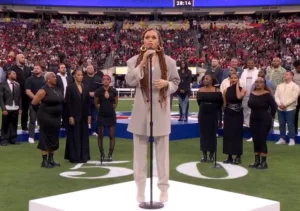
As the echoes of Super Bowl LVI’s halftime show fade away, discussions surrounding the pregame performances have ignited a firestorm of debate across social media platforms.
While the rendition of the national anthem by Reba McEntire stirred differing opinions among fans, it was Andra Day’s rendition of “Lift Every Voice and Sing,” often referred to as the Black national anthem, that sparked significant controversy.
“Lift Every Voice and Sing,” a powerful anthem adopted by the NAACP, has served as a rallying cry for liberty and hope within the Black community since its inception in 1900.
Its resonance during the Civil Rights Movement of the 1950s and 1960s solidified its place in history as a symbol of perseverance in the face of adversity.
However, amidst the celebration of diversity and inclusion, voices of dissent emerged, challenging the decision to include the Black national anthem in the Super Bowl pregame festivities.
Republican lawmaker Rep. Mike Loychik expressed his disapproval, stating, “There’s no such thing as a black national anthem. We are all AMERICANS, united by our great and beautiful Star-Spangled Banner.” Loychik’s sentiment was echoed by journalist Megyn Kelly, who took to Twitter to voice her concerns, arguing that the inclusion of a separate anthem undermines the unity symbolized by the national anthem.
These sentiments were echoed by others, who emphasized the importance of unity over division. One individual remarked, “Growing up, I wasn’t taught that the National Anthem was for white or black people. We were taught that it was for all Americans.” This sentiment reflects a broader belief that a national anthem should represent the collective identity of a nation, transcending racial boundaries.
In the midst of these debates, it’s crucial to recognize the complexities inherent in discussions of national identity and representation.
While some view the inclusion of the Black national anthem as a powerful acknowledgment of the struggles and triumphs of Black Americans, others perceive it as a divisive gesture that detracts from the overarching message of unity.
As the Super Bowl continues to serve as a cultural touchstone for millions of Americans, the discussions sparked by its pregame performances highlight the ongoing dialogue surrounding identity, representation, and the pursuit of unity in a diverse society. In the end, it’s not just about the songs themselves but the conversations they inspire and the deeper questions they raise about who we are as a nation